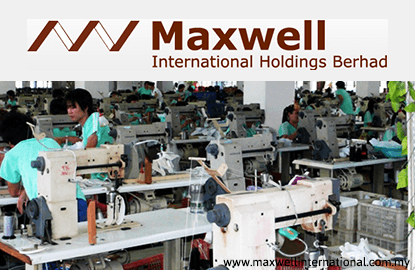
This article first appeared in The Edge Malaysia Weekly, on February 22-28, 2016
 Last week, audit firm Baker Tilly Monteiro Heng (BTMH) dropped a bombshell on Maxwell International Holdings Bhd when it questioned the authenticity of the cash held by the China-based sportswear manufacturer.
Last week, audit firm Baker Tilly Monteiro Heng (BTMH) dropped a bombshell on Maxwell International Holdings Bhd when it questioned the authenticity of the cash held by the China-based sportswear manufacturer.
It was revealed on Feb 17 that Maxwell’s statutory auditor BTMH had yet to obtain any documentary evidence of the placement of RM103.7 million as short-term deposits in asset management company, Jinjiang Jin Chuang Private Capital Management Co Ltd.
The auditor was also concerned about the recoverability of the deposits, which were placed in the third and fourth quarters of 2015, as it did not obtain sufficient information on the nature of Jin Chuang’s business.
It has not gone unnoticed that most China-based companies listed on Bursa Malaysia — also known as red chips — are cash-rich with low debt levels. However, the authenticity of their cash pile has always been a lingering question.
For instance, despite a huge cash balance, sports shoes maker XingQuan International Sport Holdings Ltd proposed a rights issue with free warrants last September to raise RM50.7 million for the purchase of machinery.
Its peers — Multi Sports Holdings Ltd and Xidelang Holdings Ltd — also made cash calls despite sitting on large cash reserves.
Under scrutiny, these companies often explained that the rationale for their rights issues was to raise fresh capital for business expansion while maintaining a healthy cash balance at all times.
Interestingly enough, while the reasons given raised more questions than answers, no auditor had expressed concerns over the authenticity of the cash piles of the China-based companies.
Maxwell is now facing a triple whammy as Ferrier Hodgson Monteiro Heng, a subsidiary of BTMH, is undertaking a special audit on its hefty advertising spend of RMB92.4 million (RM58.56 million) for one year in China that was incurred for setting up 390 marketing billboards and light emitting diode (LED) signboards.
To recap, Maxwell reported a significant net loss of RM46.25 million in its third quarter ended Sept 30, 2015 (3QFY2015), which was attributed to advertising expenditure, compared with a net profit of RM12.18 million in the previous corresponding period.
During the quarter, it incurred selling and distribution expenses of RM42.59 million, which was a sharp jump from RM1.09 million previously. In an audit of the company’s financials, BTMH highlighted the surging advertisement expenditure for 3QFY2015.
Meanwhile, a possible legal conflict at Maxwell’s subsidiary in China could be another shockwave coming its way.
BTMH noted that a company called Zhenxing — a subsidiary of Maxwell — was being sued by Fujian Quanzhou Li Cheng Qu Chuang Xing Micro Credit Co Ltd due to a dispute on a loan agreement.
The defendants in the case comprise Zhenxing as the borrower, Maxwell executive director Jenny Li Kwai Chun and two others as the guarantors. Li said the loan controversy involved her as a personal guarantor and not Zhenxing.
It looks like the authenticity of Maxwell’s cash pile is the biggest of the three issues.
In 3QFY2015, Maxwell’s cash and cash equivalents dropped a substantial 30% to RM257 million. And in the same period, RM103.7 million was taken out and placed as “short-term deposits with a finance company”, which came under the spotlight for the wrong reason recently.
“What took Maxwell so long to prove the existence of its cash deposits?” asks a corporate observer. “Why was it so hard to confirm the status of the RM103.7 million placed with the asset management company? All they needed to do was to show their bank statement.”
Over the years, bad publicity surrounding China-based companies stopped investors from buying their shares. However, Maxwell was able to separate itself from the bad apples. Unfortunately, the issues raised by BTMH, the sixth largest accounting and business advisory firm in Malaysia, have changed its position.
In 2014, China Stationery Ltd (CSL) could not submit its audited annual statements for the financial year ended Dec 31, 2013 (FY2013), due to a fire at one of its plants in Fujian province. Its auditor, Messrs RT LLP, said it was unable to proceed with “walk-in bank confirmations”, to sight its fixed assets as well as to complete the audit fieldwork on CSL’s subsidiaries in China.
Similarly, convenient food specialist HB Global Ltd failed to submit its annual audited accounts for FY2013 following a change in its auditor to UHY Lee Seng Chan & Co after Paul Wan & Co gave notice not to seek reappointment.
Messrs Helmi Talib & Co, the external auditor of China Ouhua Winery Holdings Ltd, expressed a qualified opinion on the company’s accounts for FY2013 as it was unable to verify the figures in the company’s trade and other receivables.
It also raised doubts about the recoverability of RMB118.8 million in deposits that China Ouhua Winery had paid to acquire land in Yantai City.
Save by subscribing to us for your print and/or digital copy.
P/S: The Edge is also available on Apple's AppStore and Androids' Google Play.